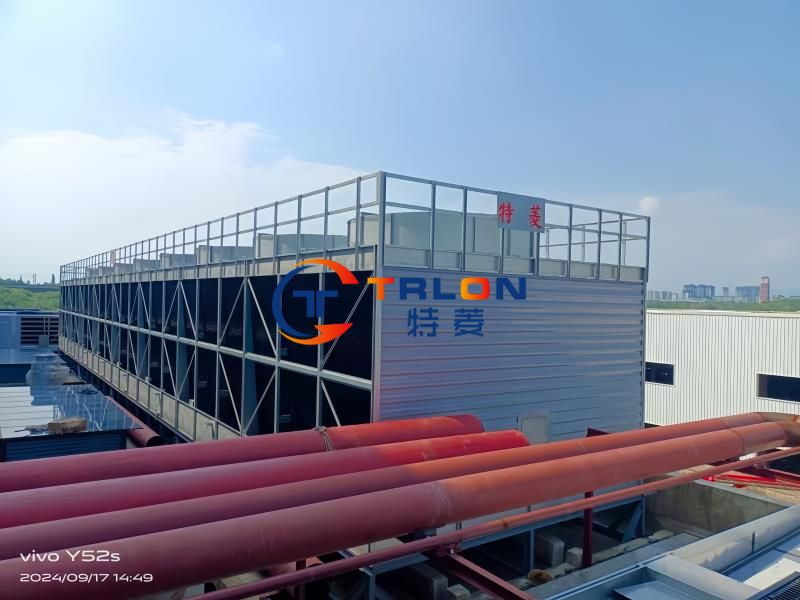
The correct operation method of cooling tower
Although the cooling tower is an accessory equipment in the air conditioning refrigeration system, it plays an important role in dissipating the total heat absorbed by the entire system. Therefore, the correct operation of the cooling tower directly affects the cooling effect and energy saving of the entire air conditioning system. Due to the widespread misoperation of the cooling tower mentioned above, and the existence of the entire process from startup to shutdown, its harm is extremely high and should be highly valued by relevant operators and managers.
The correct operation method and requirements for cooling towers are:
1. The number of cooling towers used should match the number of units that have been turned on.
2. Close the inlet and outlet valves of the cooling tower that cannot turn on the fan to prevent cooling water from flowing through the unused tower.
3. After temporarily opening the cooling tower fan, do not forget to close the inlet and outlet valves of the tower,
4. After each shift, the operation of the cooling tower should be checked. If cooling water is found passing through a cooling tower without a fan turned on, the inlet and outlet valves of the tower should be closed in a timely manner. Adjust the water level of the water tray. The condenser, evaporator, and screw chiller of the air conditioning system are equipped with electric valves in some units, but the electric valves are prone to malfunction and failure. Therefore, it is necessary to strengthen inspections to ensure the normal and correct operation of the system. The refrigeration process is actually a heat exchange process. The heat exchange of chiller units is more complex than that of window type, split type, and cabinet type air conditioners. The former is indirect refrigeration, while the latter is direct refrigeration.
Noise control of cooling tower
1. Sound source analysis:
Cooling towers are widely used in cooling water circulation systems in urban hotels, restaurants, shopping malls, office buildings, and other industrial enterprises such as petroleum, chemical, power generation, and metallurgy.
The noise source of the cooling tower consists of the following parts:
(1) Fan intake and exhaust noise;
(2) Water splashing noise;
(3) Noise from fan reducers and electric motors;
(4) Noise from cooling tower water pumps, piping, and valves.
Due to the operation of the cooling fan, rotational noise, vortex noise, and mechanical noise are generated. Their noise spectra all have wideband characteristics. Its noise level is not very high, but it has strong penetration. It will have an impact on the surrounding residents and buildings, and is also one of the reasons for the formation of other noise sources. Among them, the main noise is the intake and exhaust noise of the fan operation and the water spraying noise. The fan radiates noise outward through the intake and exhaust ports and the tower body. The exhaust noise is about 5-10 dB (A) higher than the intake noise, and its spectral characteristics are mainly low-frequency continuous spectrum, belonging to low-frequency noise. When circulating hot water falls from the water spraying device, it collides with the accumulated water in the water receiving tray at the bottom of the tower, producing high-frequency noise. The magnitude of the water spraying sound is related to the water spraying height and the water flow rate per unit time. The overall noise of the cooling tower is a continuous spectrum dominated by low frequencies, with no prominent noise wind values, generally between 31.5-2000Hz, and a noise level of about 55-85dB (A).
2. Governance methods:
(1) Control the noise at the inlet and outlet of the cooling tower, and select different noise reduction equipment such as mufflers and sound barriers according to the situation.
(2) Control the water spraying noise of the tower body, and use different noise reduction equipment such as soundproof rooms and soundproof barriers according to different situations.
(3) Control the noise caused by the water collection tray falling into the water, and use different noise reduction equipment such as sound-absorbing water pads and water silencers according to the situation.
(4) Control the vibration of the cooling tower by using vibration dampers and rubber soft joints and other vibration reduction equipment.
Special attention: While controlling the noise of the cooling tower, the ventilation requirements for the operation of the cooling tower should be fully considered according to the actual situation, ensuring that the installation of noise reduction equipment does not affect the operation of the cooling tower.
Article Address:https://www.trlen.com/baike/698.html
Guangdong Trlon Energy-saving Air Conditioning Equipment Co., Ltd.
Contact:Mr. Wang
Free Hotline:4008-8383-95
Company Email:sales@trlon.com
Web Site:https://www.trlen.com/
Company Address: 1916A, Block A, David Donglong Business Building, Longhua, Longhua District, Shenzhen